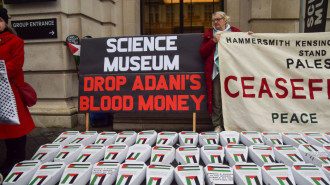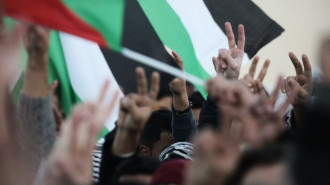
The half-blooded Moroccan: Caught between two cultures but never enough for one

“Well, you’re not really Moroccan.” These words have been seared into me as I’ve been labelled not worthy of a label – of the label.
The general Moroccan population has a very specific idea about what a “Moroccan” is.
There is a unified sense of self that comes with really being from the small North African country, a sense of comradery that allows one Moroccan to spot another across the room whether they be in London, Bangkok, or somewhere in the American midwest.
"Poor Arabic skills? Went to an English-speaking school? Unable or disinterested in chiming in during the socially expected and accepted discussions? Better off not to mention your Moroccan side at all then and avoid the humiliation"
In many ways, I can take part in that comradery. With my large deep-set brown eyes and the gold hand of Fatma dangling from my neck, I look the part.
When I’ve run into fellow Moroccans at a kiosk in a London tube station or while at lunch in Orlando, their first reaction is that of excitement, of genuine connection. But my unimpressive Arabic skills and life story soon out me as 'half-blooded.'
Born in Morocco to an American mum and Moroccan dad, I moved to the United States shortly afterwards and lived there until I was seven before moving back to Casablanca.
In the States, it was always generally accepted that I was half-American and half-Moroccan. My sister and I began learning French at six and would wear our djellabas for the cultural day at school.
Ironically though, I began feeling less Moroccan once I moved back. There was a less-than-subtle checklist of requirements for a “real” Moroccan that I struggled to meet; a checklist that schoolmates, family, and complete strangers would use to argue that my father’s rich Amazigh-Moroccan bloodline ended at him.
|
This cultural exclusion judges an individual’s language skills, personal and cultural experiences, appearance, and personality to determine their worthiness.
Poor Arabic skills? Went to an English-speaking school? Unable or disinterested in chiming in during the socially expected and accepted discussions? Better off not to mention your Moroccan side at all then and avoid the humiliation.
When I would come home from school with stories of classmates invalidating my nationality, the one I had grown up being so proud of, my father would insist, “You are Moroccan! Your dad is Moroccan. Your grandparents are Moroccan.” If only it were as cut and dry for others.
This is not an exclusively Moroccan experience. Speaking to family and friends, they too have not felt “black enough,” “Turkish enough,” “American enough,” etc. Many of these people grew up immersed in two cultures but “failed” to meet all the requirements needed to be fully accepted in at least one of their communities. The shame, anger, and frustration that comes with spending your whole life trying to prove your ethnicity or nationality is exhausting.
But this form of cultural (and racial) exclusivity is more than just emotionally draining, it can be horribly dangerous.
The comments on the Morocco World News Instagram are an excellent example of a purist, unforgiving culture that many have fallen victim to.
When the news site posted about Brahim Saadoun – a Moroccan man being sentenced to death by a Russian-backed tribunal for fighting in the Ukrainian war again Russia – many comments read that Saadoun did not deserve Morocco’s help or sympathy because he was “no longer Moroccan.”
However, both the Middle East Eye and The Guardian described Saadoun as Moroccan, so why was he not Moroccan enough for his own country?
|
The now-prisoner of war moved to Ukraine to attend the Kyiv Faculty of Aerodynamic and Space Technology.
According to a friend of Saadoun’s who spoke to Middle East Eye, the young student "fell in love with Ukraine, with the rave scene, and he often spoke about how he would like to give something back to the country that had given him so much."
This prompted Saadoun to join the Ukrainian army well before the war began, which eventually led to his capture and unjust sentencing.
While Moroccans often preach about the oneness and comradery they have with each other, it is not difficult to find a severe lack of empathy for anyone who dares step out of the skin-tight mould of a “Moroccan.”
Saadoun has been sentenced to death at just 21 years old. Despite the countless pleas from his grief-stricken and panicked family, his country and government have completely “abandoned” him.
Saadoun’s story is far more severe than that of most, but it’s an excellent example of how this radical mindset has infested and punished anyone who dares not (or simply cannot) conform.
The United States is generally considered a melting pot of languages, cultures, colours, and identities. To say someone is not “American enough” would be considered racist or nationalist. “American” can mean so many things, so why can’t “Moroccan?”
I look forward to the day I can proudly proclaim my Moroccan-Amazigh side without being met with the scepticism, confusion, and judgement I have grown up enduring.
Morocco is a beautifully diverse country. To deny its history and limit its people to a tiny list of dos and don’ts is ignorant and dismissive of the plethora of cultures, religions, and experiences Morocco possesses.
Yasmina Achlim is an Amazigh-Moroccan-American writer fascinated with culture, art, and the environment. She is a graduate of St Mary’s University in London and has lived in the United States, Morocco, and England
Opinions expressed in this article remain those of the author and do not necessarily represent those of The New Arab, its editorial board or staff, or the author's employer.


